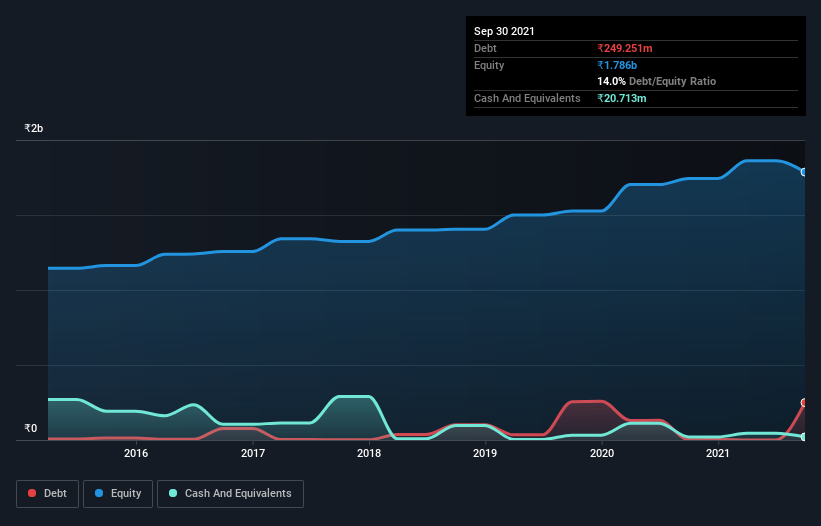Would Mahindra EPC Irrigation (NSE:MAHEPC) Be Better Off With Less Debt?
Howard Marks put it nicely when he said that, rather than worrying about share price volatility, 'The possibility of permanent loss is the risk I worry about... and every practical investor I know worries about.' It's only natural to consider a company's balance sheet when you examine how risky it is, since debt is often involved when a business collapses. We can see that Mahindra EPC Irrigation Limited (NSE:MAHEPC) does use debt in its business. But is this debt a concern to shareholders?
Why Does Debt Bring Risk?
Debt is a tool to help businesses grow, but if a business is incapable of paying off its lenders, then it exists at their mercy. Ultimately, if the company can't fulfill its legal obligations to repay debt, shareholders could walk away with nothing. While that is not too common, we often do see indebted companies permanently diluting shareholders because lenders force them to raise capital at a distressed price. By replacing dilution, though, debt can be an extremely good tool for businesses that need capital to invest in growth at high rates of return. The first step when considering a company's debt levels is to consider its cash and debt together.
View our latest analysis for Mahindra EPC Irrigation
What Is Mahindra EPC Irrigation's Net Debt?
The image below, which you can click on for greater detail, shows that at September 2021 Mahindra EPC Irrigation had debt of ₹249.3m, up from ₹2.80m in one year. However, it also had ₹20.7m in cash, and so its net debt is ₹228.5m.

A Look At Mahindra EPC Irrigation's Liabilities
Zooming in on the latest balance sheet data, we can see that Mahindra EPC Irrigation had liabilities of ₹1.09b due within 12 months and liabilities of ₹6.93m due beyond that. On the other hand, it had cash of ₹20.7m and ₹1.58b worth of receivables due within a year. So it actually has ₹503.7m more liquid assets than total liabilities.
This excess liquidity suggests that Mahindra EPC Irrigation is taking a careful approach to debt. Given it has easily adequate short term liquidity, we don't think it will have any issues with its lenders. When analysing debt levels, the balance sheet is the obvious place to start. But it is Mahindra EPC Irrigation's earnings that will influence how the balance sheet holds up in the future. So if you're keen to discover more about its earnings, it might be worth checking out this graph of its long term earnings trend.
In the last year Mahindra EPC Irrigation had a loss before interest and tax, and actually shrunk its revenue by 19%, to ₹2.2b. We would much prefer see growth.
Caveat Emptor
Not only did Mahindra EPC Irrigation's revenue slip over the last twelve months, but it also produced negative earnings before interest and tax (EBIT). To be specific the EBIT loss came in at ₹53m. On a more positive note, the company does have liquid assets, so it has a bit of time to improve its operations before the debt becomes an acute problem. But we'd want to see some positive free cashflow before spending much time on trying to understand the stock. So it seems too risky for our taste. When analysing debt levels, the balance sheet is the obvious place to start. But ultimately, every company can contain risks that exist outside of the balance sheet. For example, we've discovered 2 warning signs for Mahindra EPC Irrigation that you should be aware of before investing here.
When all is said and done, sometimes its easier to focus on companies that don't even need debt. Readers can access a list of growth stocks with zero net debt 100% free, right now.
New: Manage All Your Stock Portfolios in One Place
We've created the ultimate portfolio companion for stock investors, and it's free.
• Connect an unlimited number of Portfolios and see your total in one currency
• Be alerted to new Warning Signs or Risks via email or mobile
• Track the Fair Value of your stocks
Have feedback on this article? Concerned about the content? Get in touch with us directly. Alternatively, email editorial-team (at) simplywallst.com.
This article by Simply Wall St is general in nature. We provide commentary based on historical data and analyst forecasts only using an unbiased methodology and our articles are not intended to be financial advice. It does not constitute a recommendation to buy or sell any stock, and does not take account of your objectives, or your financial situation. We aim to bring you long-term focused analysis driven by fundamental data. Note that our analysis may not factor in the latest price-sensitive company announcements or qualitative material. Simply Wall St has no position in any stocks mentioned.
About NSEI:MAHEPC
Mahindra EPC Irrigation
Manufactures, sells, and markets micro irrigation systems in India and Uganda.
Adequate balance sheet with low risk.
Market Insights
Community Narratives



